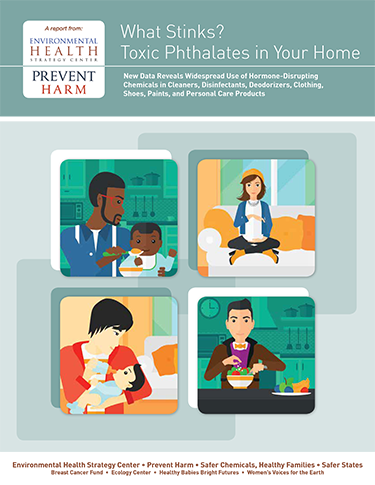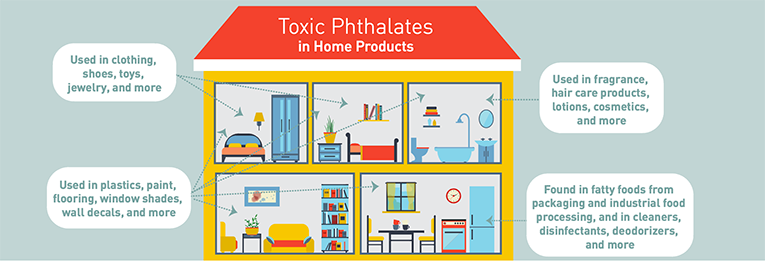New report reveals toxic phthalates “everywhere.” Used in products from 3M, Hallmark Cards, The Gap, Sherwin-Williams Company, True Value, and More
Full Report: bit.ly/WhatStinks
 PORTLAND, ME — Newly disclosed information shows toxic hormone-disrupting chemicals are used in a broader range of household products than previously known. For the first time, manufacturers of paints and cleaning products available across the country have been required to disclose their uses of hormone-disrupting chemicals called phthalates (THAL-eights), revealing phthalates use as a fragrance ingredient in these products.
PORTLAND, ME — Newly disclosed information shows toxic hormone-disrupting chemicals are used in a broader range of household products than previously known. For the first time, manufacturers of paints and cleaning products available across the country have been required to disclose their uses of hormone-disrupting chemicals called phthalates (THAL-eights), revealing phthalates use as a fragrance ingredient in these products.
A new national report — What Stinks? Toxic Phthalates in Your Home — presents data generated by a Maine chemical-use reporting requirement, for products sold across the country. The report was conceived and authored by the Maine-based Environmental Health Strategy Center and Prevent Harm and is cosponsored by Safer Chemicals, Healthy Families and Safer States, Breast Cancer Fund, Ecology Center, Healthy Babies Bright Futures, and Women’s Voices for the Earth.
In addition to the first-time disclosures about toxic phthalates in specific paints and cleaners, manufacturers reported the use of phthalates in vinyl clothing, shoes, and fragranced personal care products. Reporting companies included 3M, which revealed phthalates in the fragrances of cleaners, disinfectants, and deodorizers, and the Gap, Inc. which reported phthalates used to soften the plastic tips of shoelaces and drawstrings.
“This data provides new examples of products that are letting these hormone-assaulting chemicals infiltrate our bathrooms, kitchens, schools — and, ultimately, our bodies,” said Mike Belliveau, executive director of the Maine-based Environmental Health Strategy Center and Prevent Harm, lead sponsors of the new report. “To protect public health, manufacturers and retailers should move quickly to replace phthalates with safer substitutes.”
Chemical-use disclosure required by the Maine Department of Environmental Protection is the basis for the report, and shows 14 manufacturers reported the use of four phthalates in 130 products.
Phthalates are tied to reproductive harm, learning disabilities, and asthma and allergies — even at low levels of exposure. Strong science linking phthalates to health hazards has led to strong restrictions throughout Europe, and several phthalates are prohibited in children’s products in the United States.
A growing number of states, including California, Maine, Oregon, Vermont and Washington, have passed laws that authorize mandatory disclosure of chemicals in products that may harm the health of babies and children. But reporting requirements still exempt many types of common household products.
“That means it’s likely the data reported represents just the tip of the iceberg for uses of phthalates in household products,” Belliveau said. “It also is very likely that many manufacturers are illegally failing to disclose their uses of phthalates.”
Phthalates are mainly used as plasticizers, making vinyl plastic flexible. However the most prolific data in the Maine reporting came from manufacturers using phthalates as a fragrance ingredient.
Phthalates were reported as an ingredient in fragrance for more than half of the products. “Fragrance” can include dozens of chemicals, and there is no requirement that companies must disclose these ingredients publicly. In more than a third of the products reported in Maine, phthalates use is as a plastic softener in clothing, toys, and home maintenance products.
Among the priority chemicals Maine requires for disclosure are four types of phthalates: diethylhexyl phthalate (DEHP), diethyl phthalate (DEP), benzyl butyl phthalate (BBP), and dibutyl phthalate (DBP).
“This new report can help retailers identify the types of products where phthalates are still hiding on store shelves,” said Mike Schade, Mind the Store campaign director for Safer Chemicals, Healthy Families. “Big retailers should use their purchasing power and influence to drive these unnecessary toxic chemicals out of fragrance and plastics.”
“In the absence of any federal laws requiring ingredient disclosure for cleaning products and fragrance ingredients, this new data provides crucial information women can use to reduce their exposure to chemicals like phthalates that can cause reproductive harm,” said Erin Switalski, executive director of Women’s Voices for the Earth. “We urge the cleaning product companies that have reported using phthalates to commit to the elimination of this toxic chemical.”
“This report shows that our families are being exposed to dangerous ingredients that are hiding in the products we use every day,” said Janet Nudelman, Breast Cancer Fund Director of Program and Policy. “Consumers have an urgent right to full disclosure of all, and not just some, of the chemicals such as phthalates in their personal care and cleaning products so they can make safer, more informed purchases.”
About Environmental Health Strategy Center and Prevent Harm: As a public health organization, the Environmental Health Strategy Center works to ensure that all people are healthy and thriving in a fair and healthy economy by reducing exposure to toxic chemicals in our homes and promoting products that are safe for people and the planet. In state and national campaigns, we use research and education to reform policies, change the marketplace, and advance science-based solutions that are socially just. Prevent Harm is our advocacy and political action partner. Both organizations are based in Maine.

